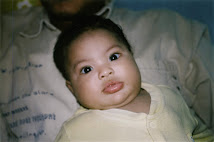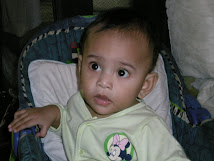Source: Sunday Star August 19, 2007 So you’re about to be a mum ... congratulations! IF this is your first baby, you won’t have a clue what to expect. Relatives and friends will all want to give you advice, but with so many people telling you all sorts of things, who do you listen to? Don’t be overwhelmed. Listen to your own body – it is “programmed” to support the needs of your growing baby over the next nine months. And just so that you’re not taken completely by surprise, this article will help you understand the weird and wonderful changes that will occur. The first three months Two weeks after you conceive, your body is already preparing for pregnancy, whether or not you realise it! One of the first signs is mild vaginal bleeding that looks like a scanty period. This happens when the fertilised egg implants into the lining of your uterus. Due to hormone changes, your breasts will feel quite tender, as well as fuller and heavier. You may also struggle with “morning sickness” (though some women say they have sailed through pregnancy without a moment of nausea, lucky things!). Although the bouts of queasiness, nausea or vomiting tend to be worse in the morning, they can actually occur throughout the day. It helps to eat frequent, small meals and drink a lot of fluids. You will also feel unusually fatigued during this time. This is expected, as your body is producing more blood to carry nutrients to the baby, causing your heart to pump faster and harder, and your pulse to quicken. With the extra blood going to your uterus, instead of to your brain, you may occasionally feel dizzy and lightheaded. Some fainting spells may be expected during any stage of the pregnancy. Get as much rest as you can, do not stand for prolonged periods of time and get up slowly after lying or sitting down. There are some changes that your friends may be too shy to tell you about. Going to the toilet more often? Increased urination is common during the first trimester because your growing uterus presses on your bladder. Be prepared that you may inadvertently leak urine when sneezing, coughing or laughing (don’t worry, you’re not permanently incontinent). Or perhaps you’re not going to the toilet as often as you should. Constipation can occur during the first 13 to 14 weeks of pregnancy, due to an increase in the hormone progesterone, which slows the digestive process. Drink plenty of fluids and eat more fibre, to prevent this. The second trimester You may find the next three months to be the most enjoyable stage of pregnancy! You will start getting used to carrying that lovely bump, as the baby is not big enough yet to crowd your abdominal organs. And so many people will stop you on the street to congratulate you! It will be quite interesting to see your own breasts growing larger, as the milk-producing glands get bigger and a small amount of fat accumulates. Some leg cramps, particularly at night, are to be expected, because your uterus is placing pressure on the veins that carry blood from your legs. Whenever you get cramps, stretch the affected muscle slowly. Later on in the pregnancy, you will find that your feet and ankles may become swollen. As you have experienced earlier, your body is producing more blood. Increased blood circulation can soften your gums, so you may notice that your gums bleed a little when you brush or floss your teeth. Increased blood flow can also cause temporary snoring, nasal congestion or nosebleeds. However, the increased blood circulation produces a wonderful side effect – it sends more blood to the tiny blood vessels just underneath the surface of your skin, so you will be positively glowing! Last three months ... finally! Do you feel like you’re carrying an entire football team in your womb? Your baby is getting larger every day, and kicking you in the ribs as he/she starts moving around quite a lot. The baby is also pushing your stomach out of its normal position, and this can cause heartburn (a burning discomfort in the chest, caused by stomach acid going into the oesophagus). To prevent this, eat small meals and drink plenty of fluids. You may also experience shortness of breath and find that you get winded easily. This is because your uterus is expanding right beneath your diaphragm, which is the muscle just below your lungs. Without realising it, you’ve become one of those women walking around bent slightly backwards, with your hand constantly on your lower back. Carrying a little person inside you can put a real strain on your back, and you will find that you can’t stand or walk for too long. A hot or cold compress to the aching area may help, as will a massage from your partner. You might want to avoid looking down at your ankles because they’ve probably turned into something from a horror movie. Swollen feet and ankles are common because your growing uterus puts pressure on the veins that return blood from your feet and legs. Your legs will look a little scary as well, with all those veins poking out. Nothing to worry about – these are called varicose veins, where the veins grow larger to accommodate increased blood volume produced by your body. If your legs feel uncomfortable, sit or lie down with your legs elevated, or wear support stockings. The increased blood circulation may cause small reddish spots to appear on your face, neck, upper chest or arms, and there may be tiny lines sprouting from these spots, making them look like spider legs. Don’t worry, these are just tiny blood vessels, sometimes called spider veins. But what about those awful looking stretch marks on your stomach, breasts, buttocks and thighs? Unfortunately, they can’t be prevented because your skin will have to stretch to accommodate the growing baby. After birth, the marks will slowly fade in intensity. In the meantime, use moisturisers to cope with the itchiness. Whew! By now, you’ll really be looking forward to the day when all this is over. But these nine months are only the beginning. After that, the next chapter of your life with your new baby will begin!
“YA ALLAH, AKU BERLiNÐUNG KEPAÐAMU ÐARiPAÐA PERASAAN SEÐiH ÐAN ÐUKACiTA, AKU BERLINÐUNG KEPAÐAMU ÐARiPAÐA LEMAH ÐAN MALAS, AKU BERLiNÐUNG KEPAÐAMU ÐARiPAÐA BAHKiL ÐAN PENAKUT ÐAN AKU BERLiNÐUNG KEPAÐAMU ÐARiPAÐA BEBAN HUTANG ÐAN TEKANAN PERASAAN.”
“YA ALLAH, BUKAKANLAH UNTUKKU PiNTU-PiNTU KEBAiKAN, PiNTU-PiNTU KESELAMATAN, PiNTU-PiNTU KESiHATAN, PiNTU-PiNTU KENiKMATAN, PiNTU-PiNTU KEBERKATAN, PiNTU-PiNTU KEKUATAN, PiNTU-PiNTU CiNTA SEJATi, PiNTU-PiNTU KASiH SAYANG, PiNTU-PiNTU REZEKi, PiNTU-PiNTU iLMU, PiNTU-PiNTU KEAMPUNAN ÐAN PiNTU-PiNTU SYURGA, YA ALLAH YANG MAHA PENGASiH LAGi MAHA PENYAYANG.”
Rabu, Januari 30, 2008
Nine months
Susunan :
Bawang Goreng
pada
1/30/2008 05:49:00 PTG
Langgan:
Catat Ulasan (Atom)
















































0 KOMEN:
Catat Ulasan
Kongsikan komen anda di sini...